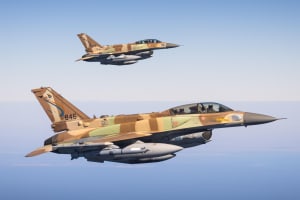Israeli security analyst: Iran at its weakest in 45 years, Israel could strike before US deal
Dr. Diker says Israel, US and Saudi Arabia have 'opportunity to create a global coalition'

Israel could attack Iran’s nuclear sites before the end of the U.S.-Iran nuclear talks, says Israel analyst Dr. Dan Diker, president of the Jerusalem Center for Security and Foreign Affairs.
Dr. Diker spoke at an event last week called Voices of Valor, organized by Ynet, ILTV News, and Israel+ for Memorial Day and Independence Day, where he stated that the Islamic Republic has “been hit very hard” by Israel over the last year.
During an interview with ILTV’s Lidar Grave-Lazi, Dr. Diker spoke about the possibility of an Israeli strike against Iran.
Responding to the question, “Is Israel missing an historic opportunity to deal a deadly blow to the regime once and for all, in your view?” Dr. Diker said the Jewish state still has an opportunity, but also affirmed that “Iran has been dealt a blow” by Israel.
“There have been two direct attacks by Israel,” Dr. Diker pointed out. “Israel has just completely destroyed its air defense system in strategic strikes.”
Dr. Diker noted that the Iranian proxy strategy, which appeared to be very solid at the outbreak of the Oct. 7 Gaza War in 2023, “has essentially been destroyed.”
“Let's remember, Iran is not Iran only,” Diker argued. “It's Iran and what they call the axis of resistance, the terror proxy network. That has essentially been destroyed. It has been dismantled.”
This has led to an unprecedented weakening of Iran, according to Dr. Diker.
“Iran is at its most vulnerable that it's been in 45 years. And Israel has the opportunity to take military action.”
However, the analyst also argued that this weakness gives Israel time to make a decision.
“It’s just a question of stages,” he noted. “Stage one is high-leverage diplomacy led by the United States.”
He emphasized that U.S. President Donald Trump “has said the military option is there.”
Diker acknowledged that the negotiations are “a very high-risk strategic game,” but said that “Israel and the United States are aligned.”
Calling the coordination between the two “a tag team," Diker admitted, “It may be that Israel launches a military strike even before the end of talks.”
Talks between Iran and the U.S. appear to have stalled after the most recent meeting on April 26. While the U.S. has pushed for Iran to “walk away” from uranium enrichment, Iranian Foreign Minister Abbas Araghchi has rejected the demand, stating, “Iran has every right to possess the full nuclear fuel cycle.”
In a possible move to increase pressure on the Islamic Republic, U.S. Secretary of Defense Pete Hegseth is expected to visit Israel next week, Axios reported.
The visit comes ahead of a planned Middle East trip by President Trump later this month.
Amid reported tension between the U.S. and Israel over the negotiations and potential military strikes on Iran’s nuclear facilities, the visit by Hegseth, a supporter of military action against Iran, could be meant to calm Israeli fears.
Last week, former Mossad director Yossi Cohen called for Israel to “do everything in its power – diplomatically, politically, and if necessary, operationally – to ensure that Iran never acquires nuclear weapons.”
“Such weapons would pose an existential threat to our nation, our people, and the very future of the Jewish state,” Cohen stated.
A poll conducted by the Israel Democracy Institute last week found that 45% of Israelis support an Israeli strike on Iran.
Dr. Diker also said the realignment of power in the region following Israel’s demolishing of the Iranian terror proxy strategy “has global implications and a global echo effect.”
Pushing back against warnings by some analysts that uncertainty in the talks could push Saudi Arabia away from both the U.S. and Israel, Dr. Diker said, “The United States and Saudi Arabia, together with Israel, has now the opportunity to create a global coalition in order to first and foremost stabilize the Middle East, secure Israel, and by definition create a defense effect against the rise of China and an unfriendly Russia.”
He called this the “Trump-MBS vision for the Middle East,” referring to Crown Prince Mohammed Bin Salman.
Dr. Diker also claimed that if the countries are successful, “Israel, the United States, and Saudi Arabia could actually be leading towards a new era of security, stability, and prosperity.”

The All Israel News Staff is a team of journalists in Israel.














